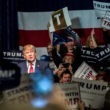Edel Rodríguez
On March 24, Donald Trump tweeted that 5,000 ISIS fighters had infiltrated Europe. He concluded, “I alone can fix this problem.” Three days later, he said virtually the same thing: “Another radical Islamic attack, this time in Pakistan, targeting Christian women & children. At least 67 dead, 400 injured. I alone can solve.”
“I alone.”
“I alone can solve.”
At a town hall discussion with Chris Matthews, the MSNBC host asked Trump how he expects cooperation with the Muslim world in fighting ISIS when he has pledged to ban Muslims from entering the United States.
Trump responded, “I have been told by more Muslims who are saying ‘what you are doing is a great thing, not a bad thing.’” He added, “believe it or not, I have a lot of friends who are Muslim, and they call me. In most cases they are very rich Muslims, O.K.?”
Out popped Matthews with what he was sure was a Trump-stopping zinger: “But do they get into the country?” (I mean, what kind of friend bans his friends from the country?) Without missing a beat, Trump responded, “They’ll come in. And you’ll have exceptions.”
Who decides?
I alone decide.
This is what Louis XIV is reported to have said to the Parliament of Paris: L’etat, c’est moi. “I am the state.”
In the Trumpverse, there are no laws.
There’s a lot wrong with America’s Constitution. But at the very least, historically, it was a quantum leap forward in a principle that is at the heart of humanity’s long march from barbarism to civilization: the rule of law, not of men. Lex, Rex, as the Scottish jurist Samuel Rutherford put it in 1644—“the law is king.” Instead of, in the heretofore brutish history of humankind, the other way around, that the king is law. Not here. Not in America. That principle, universally understood, was why, back in the 1970s, a lowly African-American security guard named Frank Wills became a national hero: it was Wills who alertly noticed, in the wee hours of June 17, 1972, an errant strip of tape that kept open a door in the Watergate parking garage. That discovery and what came after it would, some 26 months later, bring down a president. The Washington Post then sought Wills out for an interview that ran on the front page on August 8, 1974. It was headlined, “Guard says no position too high.”
With President Trump, no longer. In a recent interview with The Donald, the Post’s Bob Woodward awkwardly inquired as to what lessons he took from America’s experience with Richard Nixon.
“It was just that personality,” Trump answered. “Very severe, very exclusive . . . And people didn’t like him. I mean, people didn’t like him.”
Woodward: “And he broke the law.”
Right, that: “And he broke the law. Yeah. He broke the law. . . . Unfortunately, it was a very sad legacy in the end. It turned out to be a very sad legacy. Such an interesting figure to study.”
Woodward: “Do you take any lessons from that? Because a what he did is he converted the presidency to an instrument of personal revenge.”
“No, I don’t. I don’t see that. What I do see is—what I am amazed at is, I’m somebody that gets along with people. . . I have the biggest crowds.”
In the Trumpverse, there are no laws.
In the same interview, Robert Costa of the Post asked Trump about his First Hundred Days as president. After, that is, he finishes renegotiating the trade deals. “What about legislation? What about economic legislation?” Trump responded,
“Before I talk about legislation, because I think frankly this is more important—number one, it’s going to be a very big tax cut.”
Yes, the imminent Republican nominee for the presidency of the United States doesn’t know that it takes legislation to cut taxes. The president just . . . decides it.
Trump, alone. With a crowd of supporters. Who adore him, and in his mind exist to do his bidding.
At bottom, the purpose of a constitution is to provide procedures to coordinate collective action in a way that transcends brute force. A constitution is a machine for governing without guns. (Not for nothing is the only part of the Constitution that affirmatively mentions regulation the Second Amendment.) This is the reason assassinations are so horrifying: they are the most dramatic possible blot on the ideal of governing beyond the a whims of mere individuals. We also have other ways of accomplishing the same goal, such as norms of polite behavior: “manners.” There is, too, international law. Which is another problem for Trump: “The problem is we have the Geneva Conventions, all sorts of rules and regulations, so the soldiers are afraid to fight,” he said in March, while campaigning in Wisconsin.
Cut Trump to his essence, and these developments, laws, norms, constitutional constraints, taken together, are what he and his supporters seem to find the most objectionable in human history. “Nobody wants to hurt each other any more,” he lamented at one rally. That’s why protesters are able to protest (and not because of, say, the Bill of Rights to the Constitution): “They realize that there are no consequences to protesting any more.”
“Because I understand life. And I understand how life works. I’m the Lone Ranger.”
“Greatness” is equated with unfettered violent action: “I love the old days. You know what they used to do in the old days in an awful place like this. They’d be carried out in a stretcher, folks. a I’d like to punch him in the face, I’ll tell you.”
You want laws? Here’s the law. Carry out my will, and I will protect you. (“It’s not like I’m worried someone’s actually going to come shoot me down,” Trump nemesis Megyn Kelly told Charlie Rose on CBS, when asked about the death threats she’s been receiving. “But I do worry someone’s gonna try to hurt me in the presence of my children.”) The scholar Zeynep Tufekci revealed the extent to which his followers treat Trump as the sole source of truth and authority—and that “every unpleasant claim about Donald Trump is a fabrication by a cabal that includes the Republican leadership and the mass media.” They know, for example, because Trump told them, that Congress funded ISIS. So why would you trust Congress to write laws? Although, there is one example I can think of where Trump mentioned the necessity of Congress (re)writing laws: after someone, apparently very high in the military firmament, told him that generals will not follow his illegal orders. So he adjusted, slightly. As he put it March 30 in Appleton, Wisconsin: “We can’t waterboard, but they can chop off heads. I think we’ve got to make some changes, some adjustments.”
So what kind of people does a man like this appoint to the Supreme Court? In another recent interview, he became the first presidential candidate to announce as his litmus test for these preeminent protectors of the Constitution their willingness to prioritize his crushing of a political rival: “I’d probably appoint people who would look very seriously at [Hillary Clinton’s] e-mail disaster, because it’s a criminal activity, and I would appoint people who would look very seriously at that to start off with. . . . What she’s getting away with is absolutely murder.”
When I heard that, I thought, again, of Nixon. When Charles Manson was put on trial in 1970, President Nixon offhandedly told a group of reporters in Denver that Manson was “guilty, directly or indirectly, of eight murders without reason.” Given that the Constitution guarantees the accused “the right to speedy and public trial, by an impartial jury,” what was described as Nixon’s “blunder” became an immediate scandal dominating the news for days. The judge considered declaring a mistrial, the president was immediately forced to backtrack, insisting he didn’t intend to speculate about Manson’s guilt or innocence. Trump says such things now, and it’s hardly a blip. Who, after all, can keep count of every one of Trump’s dictatorial bleats?
Trump is a radical personalist. Why don’t women have to worry about his anti-woman statements? “No one respects women more than I do.” Why won’t we need worry about his pledge to exclude Syrian refugees? “I have a bigger heart than anybody in this room.”
I, I, I; me, me, me.
Our wise founders were radical impersonalists. When they wrote arguments for publication in newspapers, they preferred to do so anonymously, using pseudonyms like “Publius”—lest the attachment of a distinguished name distract the reader from the content and quality of the argument. Trump’s personalism, on the other hand, is how he pushes away the protection of constitutional principle with every fiber of his being.
Costa of the Washington Post: “Maybe I’m mishearing you, but I feel like you’re almost comfortable being the Lone Ranger.” “I am. Because I understand life. And I understand how life works. I’m the Lone Ranger.”
As Gabriel Sherman wrote in New York magazine, Trump employs “no pollsters, media coaches, or speechwriters. He buys few ads, and when he does, he likes to write them himself . . . college-newspaper offices have more robust infrastructure than his national campaign headquarters.” Which is a marvelous mode of operation, to govern by fiat. It abets, in fact, a constitutive feature of the fascist appeal: pure, frenetic action. It’s quite the rebuke of the sclerotic nature of our poor, old, beaten-down system of constitutional checks and balances. Which, to use a very old-fashioned phrase, only exist, after all, to safeguard our American liberties. Can checks and balances work with Trump as the officer atop the system?
It’s time for us, together, to start thinking about what happens next.
Rick Perlstein is The Washington Spectator’s national correspondent.







The marked inability to muster a coherent sequence of phrases, let alone a sentence, betrays a terrifying ongoing dementia. Hence the stubborn insistence on the dancing Jersey Muslims, and the impossible view he claimed to have had of the 9/11 “falling man” victims.
Thank you for a most insightful and astute summary of this bloviating, narcissistic, misogynistic, egotistical, rude, crass, mini-minded, megalomaniac!
I totally agree with Shelia. Well said!
This man is so dangerous! Scary